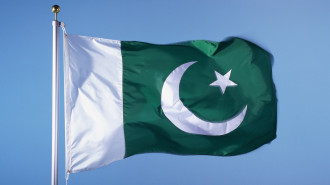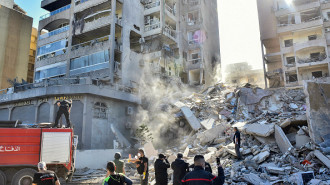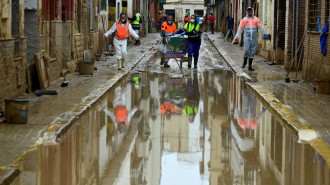Sri Lanka cremates Muslim Covid-19 victims against religious wishes
Sri Lanka cremates Muslim Covid-19 victims against religious wishes
The country's attorney-general said authorities were free to cremate 19 Muslims killed by the virus, after their families refused to claim their bodies from a morgue in the capital Colombo.
2 min read
A top court last week rejected petitions which challenged the policy [NurPhoto]
Sri Lanka said Wednesday it would cremate the bodies of 19 Muslim coronavirus victims, overriding the families' objections against the contentious policy.
The island nation has been experiencing a surge in cases since October, with the number of infections increased more than eight-fold since then to over 29,300 and 142 dead.
Coronavirus victims' bodies are claimed by families and then cremated - a practice forbidden under Islamic law - under the strict supervision of health authorities.
But families of 19 Muslims killed by the virus have refused to claim the bodies from a morgue in the capital Colombo, triggering the edict by Attorney-General Dappula de Livera.
"Bodies of Covid-19 victims not claimed by families can be cremated in terms of quarantine regulations," De Livera's spokeswoman said, adding that the bodies would be cremated this week.
Five were cremated on Wednesday, police said.
The policy has been challenged by Muslims, with 12 petitions filed by the minority community and civil society groups in the Supreme Court.
But the top court rejected the petitions last week, without giving reasons why it made that decision.
The Sri Lanka Muslim Council has said a majority of the country's coronavirus victims were Muslim.
A council spokesman added that members of the community feared seeking medical help if Covid-19 positive, as they did not want to be cremated.
The Organisation of Islamic Cooperation last month urged Colombo to permit Muslims to bury their family members "in line with their religious beliefs and obligations".
Read also: UK must lobby Sri Lanka to end forced cremation of Muslims
Sri Lanka made Covid-19 cremations compulsory in April amid fears spread by influential Buddhist monks - who support President Gotabaya Rajapaksa - that burying bodies could contaminate groundwater and spread the disease.
The World Health Organisation states both burials and cremations are permitted.
There have been ongoing tensions between Muslims - who make up 10 percent of Sri Lanka's 21 million population - and the majority Sinhalese who are mostly Buddhists, after local jihadists were accused of being behind the deadly 2019 Easter bombings.
The island nation has been experiencing a surge in cases since October, with the number of infections increased more than eight-fold since then to over 29,300 and 142 dead.
Coronavirus victims' bodies are claimed by families and then cremated - a practice forbidden under Islamic law - under the strict supervision of health authorities.
But families of 19 Muslims killed by the virus have refused to claim the bodies from a morgue in the capital Colombo, triggering the edict by Attorney-General Dappula de Livera.
"Bodies of Covid-19 victims not claimed by families can be cremated in terms of quarantine regulations," De Livera's spokeswoman said, adding that the bodies would be cremated this week.
Five were cremated on Wednesday, police said.
The policy has been challenged by Muslims, with 12 petitions filed by the minority community and civil society groups in the Supreme Court.
Twitter Post
|
The Sri Lanka Muslim Council has said a majority of the country's coronavirus victims were Muslim.
A council spokesman added that members of the community feared seeking medical help if Covid-19 positive, as they did not want to be cremated.
The Organisation of Islamic Cooperation last month urged Colombo to permit Muslims to bury their family members "in line with their religious beliefs and obligations".
Read also: UK must lobby Sri Lanka to end forced cremation of Muslims
Sri Lanka made Covid-19 cremations compulsory in April amid fears spread by influential Buddhist monks - who support President Gotabaya Rajapaksa - that burying bodies could contaminate groundwater and spread the disease.
The World Health Organisation states both burials and cremations are permitted.
There have been ongoing tensions between Muslims - who make up 10 percent of Sri Lanka's 21 million population - and the majority Sinhalese who are mostly Buddhists, after local jihadists were accused of being behind the deadly 2019 Easter bombings.
![Sri Lankan Muslims [NurPhoto] Sri Lankan Muslims [NurPhoto]](/sites/default/files/styles/large_16_9/public/media/images/B86E05F4-05D6-4E87-9E9A-3497D09D22EF.jpg?h=d1cb525d&itok=QdHw4-T6)






 Follow the Middle East's top stories in English at The New Arab on Google News
Follow the Middle East's top stories in English at The New Arab on Google News


